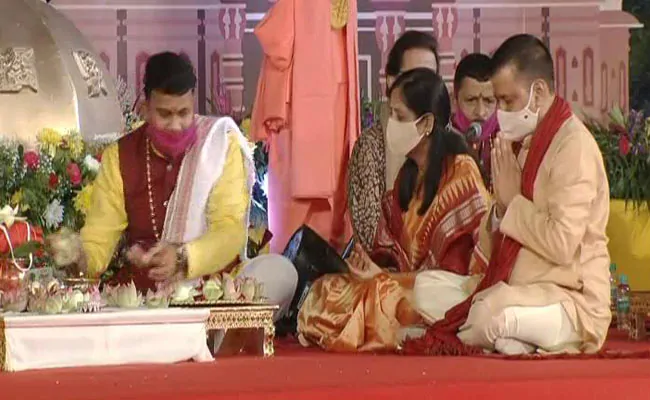In Playing Hindu Card, is Kejriwal Compromising his Identity?

Image Courtesy: NDTV twitter
On Diwali it became apparent how far Arvind Kejriwal has strayed from his roots in the India Against Corruption movement and even his first few years as the Chief Minister of Delhi. Dressed in silk and flanked by his Cabinet, he spent the evening worshipping goddess Lakshmi at a public event held at Akshardham temple. The man who once went from colony to colony in the Capital, burning electricity bills he called “inflated”, has been pandering to Hindu sentiments for quite some time. Diwali night made it obvious that his party believes this will yield electoral dividends.
The Aam Aadmi Party government wanted to redirect Delhi residents to pray rather than burst crackers on Diwali, for the sake of their health and the environment. But Delhiites flouted the cracker ban while Kejriwal prayed. Ironically, the event was organised at a temple built on the Yamuna floodplain, which violated several environment regulations.
In the past, Kejriwal was openly critical of the Congress and BJP. He asked people to demand clean governance. From 2011 to the 2015 Assembly election, he regularly drew huge crowds, suggesting that Delhi politics is driven more by class than caste. Then why has Kejriwal decided to change what was working for his party? He, like most other politicians, has decided that BJP gets people to vote in accordance with their religious identity. It is these “Hindu voters” that AAP wants to pull in. Kejriwal seems to believe he cannot afford to alienate these voters and that the BJP gains by claiming that it is the only party which attends to Hindu’s concerns.
BJP raises nationalism and demonises Muslims to get people to vote as Hindus rather than as citizens or on economic issues. Actually, during the election campaign in Delhi this year, BJP was initially far behind the AAP, but its popularity soared when its leaders raised alarmist slogans such as the infamous “goli maaro”. BJP pushed all other issues to the sideline by raising these emotive issues. Kejriwal therefore thinks that even to pursue his agenda of development he must neutralise BJP’s trump card and this has prodded him to play the soft Hindutva card.
Kejriwal’s mind seems to have changed after Modi’s victory in the 2019 Lok Sabha election. First he supported revocation of the special status of Jammu and Kashmir. On the Citizenship Amendment Act, 2019, (CAA) he swung the other way and said it is “spreading fear” among citizens. But on Shaheen Bagh he reverted to not countering the BJP and never supported the sit-in against the CAA-NRC-NPR triad. Many Muslims accepted at the time that that Kejriwal’s options are very limited and his visit to the protest would be polarising. Yet, Kejriwal needlessly said he could have “cleared up the protest within two hours” if Delhi Police had been controlled by his government and not the Centre.
Then as soon as AAP won the Delhi election, Kejriwal’s first port of call was a Hanuman temple. AAP leader Saurabh Bharadwaj picked it up from there and demanded a statue of Hanuman at Ayodhya where a Rama temple is being built, at the site where the Babri mosque once stood. Even if these flip-flops signify a tightrope walk, AAP did not come off very well after the violence in north-east Delhi in February and March. True, the police are controlled by the central government, but people feel miffed that Kejriwal said nothing for the mostly Muslim victims.
Perhaps Kejriwal believes silence on “Muslim issues” is the best way to wean away “Hindu voters” from the BJP. That is why, when confronted with two divergent paths, he has been picking the soft Hindutva route. For instance, the AAP government passed an Assembly resolution against the Centre’s National Population Register. After the Delhi violence, AAP organised relief camps and compensation for riot victims. Delhi government has twice rejected advocates chosen by the Centre to represent Delhi Police in cases related to the violence, but Kejriwal rarely spoke on behalf of the victims.
This silence surely has meaning beyond elections in Delhi, where AAP recently won 62 of 70 Assembly seats. Perhaps his party is desperate to win the 2021 Delhi municipal elections. It also has sights set on Punjab and Uttarakhand, where elections are due in 2022. In Punjab, AAP suffered a setback when it flirted with religious politics. And in Uttarakhand, it is caste and not religion that can determine electoral outcomes. That is why it is baffling why Kejriwal is wooing Hindus, not realising the perils of competitive Hindutva.
First, the BJP’s hardline Hindutva can easily overrun the soft Hindutva of its competitors. After all, “soft” Hindutva is relative to what “hard” Hindutva is. AAP will be huffing and puffing to catch up with BJP if it raises the pitch of its anti-minority rhetoric and policies. It would be pushed to switch from silence to acquiescence to Hindutva. Second, should the AAP strategy of wooing “Hindu voters” fail, it would be seen as further evidence that Kejriwal has helped BJP consolidate its hold on power. Third, by adopting a BJP strategy, AAP risks losing its own supporters. Liberal Hindus could permanently drift away from Kejriwal, fence-sitters could become disenchanted, Muslims could vote for other parties—and there is no guarantee that the “Hindu vote” will move over to AAP.
Kejriwal is forgetting that a large number of people supported him between 2011 and 2020 because they saw in AAP an alternative to BJP and Congress. They believed Kejriwal when he said joining IAC made them part of a “revolution”. AAP reformatted its clean administration plank into a drive to provide basic services such as health care, education, clean drinking water, cheap electricity and so on. These drives continue, but now he is also engaging in soft Hindutva. This will reduce the passion for Kejriwal and his politics as people would find it hard to identify with a leader who does not hold a consistent position.
AAP’s experiences in the 2017 Punjab Assembly election demonstrated that identity politics is not Kejriwal’s forte: AAP had then tried to woo Sikhs, but once the charge of “supporting Khalistanis” was levelled against his party, a section of Sikh voters—and Hindus almost completely—deserted Kejriwal. Now, since he has not spoken out for Muslims, AAP’s prospects in Punjab are likely to be dampened, for the Sikhs are a minority community too. Punjab’s Hindu votes will also get divided among AAP, Congress and the BJP and Akali Dal, because the two are no longer allies.
For all these reasons, Kejriwal should stick to the governance plank that originally attracted voters, especially the youth. His biggest support comes from the poor, who expect good governance, not temple, church and mosque visits. If Kejriwal can neutralise the BJP, it is only by sharpening the politics of interests, not identity. By playing on BJP’s turf Kejriwal is risking his party’s core agenda, which is the source of its support.
BJP’s recent improved performance in Bihar could buttress the notion that raising “Hindu concerns” holds the key to electoral success. In the 2018 Assembly election, Congress leaders in Madhya Pradesh reached out to Hindu religious figures and secured a victory. Yet in Maharashtra, BJP tried to polarise the electorate and still failed to win the election last year, as it failed in Jharkhand and Chhattisgarh and earlier in Rajasthan. In any case, the Hindu card is not likely to help AAP. The Congress has weakened secularism and the BJP is setting about to demolish it. In this race to the bottom, AAP can only be an also-ran. By doing what he thinks pleases Hindus, as opposed to trying to reform them, Kejriwal’s victories would come at the cost of India’s secular foundations and the Constitution.
Kejriwal may be trying to prove he is not “anti-Hindu” as the BJP says and seeks an opportunity to show off his governance, but he is turning the State into one that fits the BJP imagination. In other words, he is aiding the creation of a Hindu state. If their political rhetoric would be no different, it would also not matter whether AAP wins elections or BJP.
Get the latest reports & analysis with people's perspective on Protests, movements & deep analytical videos, discussions of the current affairs in your Telegram app. Subscribe to NewsClick's Telegram channel & get Real-Time updates on stories, as they get published on our website.























